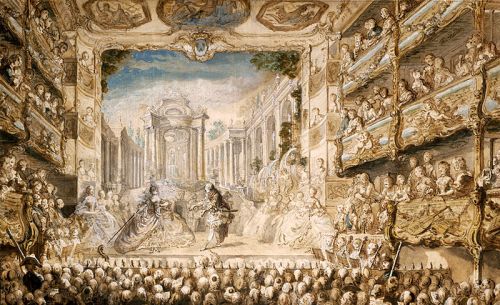Music was commonly introduced into French plays at least by the time of Molière, but after Louis XIV gave Lully a monopoly on opera in 1673 this practice was drastically circumscribed. Actors protested politely at first, but Louis did not take the hint, so dramatists began to turn to their sharpest weapon: satire.
Operagoers were depicted as ridiculous losers, and operas as overblown and barbaric. Opera houses were portrayed as venues for illicit flirtation, and opera singers as people with questionable morals. Operas were said to bay at the moon, to have no new airs, and to employ monkeys instead of poets and musicians. While this derision had no apparent effect on the opera world, it gave French comedy a rich new subject.
This according to “Comedy versus opera in France, 1673–1700” by Henry Carrington Lancaster, an essay included in Essays and studies in honor of Carleton Brown (New York : New York University Press, 1940), which is covered in RILM’s recently-issued Liber Amicorum: Festschriften for music scholars and nonmusicians, 1840–1966.
Above, Gabriel Jacques de Saint-Aubin’s depiction of Lully’s Armide as performed at the Palais-Royal in 1761.
Related articles:




Many thanks for this, Professor Selfridge-Field! RILM has been covering your writings since your 1969 dissertation, but it’s always possible that we missed some. It’s easy to submit citations and abstracts at http://www.rilm.org/submissions/index.html, and we’re very grateful when authors take the time to assure full coverage of their work.
The relationship between comedy and opera is largely unresearched. I tried to make a dent in it for the Venetian theater of the seventeenth and eighteenth centuries in my fraternal-twin books A New Chronology of Venetian Opera… and Song and Season… (both 2007), because the edges of opera as a genre are very blurry on account of the absence of basic reference tools for the comic theory. Bibliographers, please take note!
Great links!